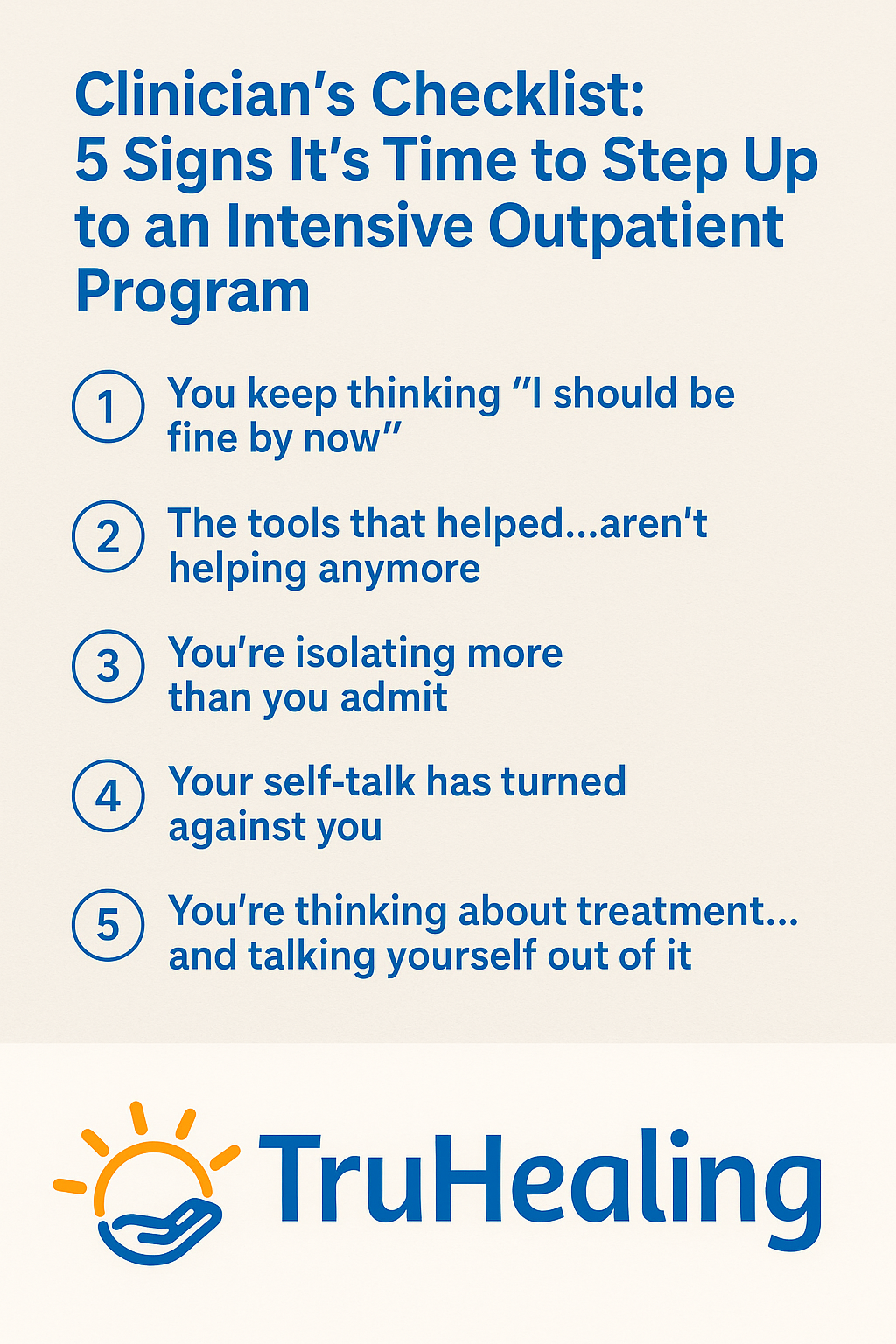Sometimes the hardest part of healing isn’t the beginning—it’s beginning again.
Maybe you started strong in treatment, and life got in the way. Maybe you ghosted after a bad group day. Maybe you’ve just been drifting. However you got here, you’re not alone. And you’re not disqualified from trying again.
At TruHealing Cincinnati, we’ve walked beside people at every point on the path—including the middle of the mess. If you’re wondering whether it’s time to step back into structure, consider these five quiet—but clear—signs your next chapter might begin with an intensive outpatient program (IOP).
1. You Keep Thinking “I Should Be Fine By Now”
This one shows up quietly—more judgment than crisis. You’re managing work. You’re functioning. From the outside, you might even look “better.” But inside? Something’s off. You’re treading water emotionally, and you’re exhausted from pretending you’re okay.
That “I should be fine by now” voice often masks something deeper: unmet needs, suppressed feelings, or the slow unraveling of progress made during treatment. If you’re white-knuckling your way through the day and calling it “coping,” it might be time to re-engage with IOP.
IOPs are made for this phase. They’re not just for first-timers or relapses. They’re a place to recalibrate when you’re stuck between survival and thriving.
2. The Tools That Helped… Aren’t Helping Anymore
Maybe you built a solid foundation in early recovery. You had go-to grounding practices. You went to group. You knew how to check in with yourself. But now, those same tools feel flimsy. Meditation isn’t cutting through the noise. Journaling feels hollow. You’re sliding back into old patterns, and you don’t know how to stop.
This is common. Tools work best when we’re connected—when someone’s there to say, “Hey, how’s that working for you lately?” IOP doesn’t just re-teach old strategies. It revives them. It adds new ones. And it lets you practice in real time with peers who get it.
Still unsure if this is where you are? Read more about our Cincinnati IOP program structure.
3. You’re Isolating More Than You Admit
You might not call it isolation yet. You still reply to group chats—sort of. You still show up to work. But the spark is gone. You avoid phone calls. You stop reaching out. The idea of being seen feels exhausting, maybe even shameful.
Isolation doesn’t always look dramatic. Sometimes it’s quiet withdrawal from the things that made you feel alive. Connection is one of the first things to slip when we’re not doing well—and one of the hardest things to rebuild on our own.
IOP offers built-in connection. Not forced. Not fake. Just consistent, safe space to hear and be heard—without having to justify where you’ve been.
4. Your Self-Talk Has Turned Against You
Everyone has an inner critic. But if your self-talk has gone from critical to cruel—“You blew it,” “You can’t show your face there again,” “They won’t want you back”—it’s time to intervene. That voice isn’t your truth. It’s your fear, trying to keep you small.
Coming back to treatment doesn’t require a perfect story. You don’t need to explain your absence. You just need to show up. IOP gives that inner voice a counterweight: real feedback, real compassion, and real community that says, “We’re glad you’re here.”
You deserve a space where healing isn’t conditional on getting it right the first time.
5. You’re Thinking About Treatment… and Talking Yourself Out of It
You’ve Googled programs. You’ve re-read old intake emails. Maybe you even clicked on the TruHealing Cincinnati website more than once. But then you close the tab, telling yourself: “It’s not that bad yet,” or “I already tried that.”
If you’re thinking about treatment, there’s a reason. That tiny spark of awareness is worth listening to. It’s not about being in crisis. It’s about being ready for more than just surviving.
And if your last attempt at treatment didn’t feel like a fit? That doesn’t mean all programs are the same. Learn more about how IOP works here in Cincinnati. This time, it could feel different.
What an IOP Actually Looks Like (And Why It Might Be Right for You)
If you’ve been out of the loop, here’s a quick refresher on what an intensive outpatient program offers:
- Flexible Scheduling: Most IOPs run 3–5 days per week, a few hours a day, so you can keep working or caregiving while still getting support.
- Therapy + Skills Groups: Topics range from relapse prevention and emotional regulation to boundary setting and identity repair.
- Clinician Support: You’re not doing this solo. Licensed therapists and counselors help guide the process and troubleshoot in real time.
- Peer Connection: Maybe the most important piece—regular time with people who’ve been where you are and still showed up.
If full residential treatment feels too much—but you know you need more than once-a-week therapy—IOP is that middle ground. If you’re local to Lexington, Kentucky or Springfield, Ohio, TruHealing offers help that meets you exactly where you are.
FAQ: Intensive Outpatient Programs & Re-Entry After Dropping Out
Is it okay to return to IOP if I dropped out or ghosted before?
Yes. At TruHealing Cincinnati, we expect pauses. Life happens. What matters is that you’re thinking about re-engaging. We welcome you back with no judgment.
Will I have to start over completely?
Not necessarily. Your treatment team will work with you to assess where you left off and what’s changed. The goal isn’t to repeat—it’s to reconnect.
What if I’m using again?
You are still welcome. IOP can accommodate individuals who are actively using or who’ve had a slip. We’ll work with you to determine if IOP is the right level of care, or if a higher level would serve you better first.
How do I know if IOP is the right fit versus outpatient therapy or residential care?
Think of IOP as the middle tier. If you’re feeling overwhelmed by symptoms, cravings, or mental health challenges but don’t need 24/7 care, IOP often strikes the right balance. Not sure? We can help you assess during an intake call.
What makes TruHealing Cincinnati’s IOP unique?
Our approach blends evidence-based therapy, trauma-informed care, and a commitment to individualized treatment. We’re rooted in Cincinnati—and committed to our community. You’re not just a client. You’re part of something.
Gentle Next Steps
You don’t have to explain everything. You don’t need a clean story or a perfect reason. If something inside you is saying, “I think I need more support,”—trust that whisper.
We’re not here to judge. We’re here to welcome you back.
📞 Ready to Reconnect?
You don’t have to explain why you left. You just have to show up. Call (888) 643-9118 or visit TruHealing Cincinnati’s intensive outpatient program to explore your next step. We’ll meet you where you are.


